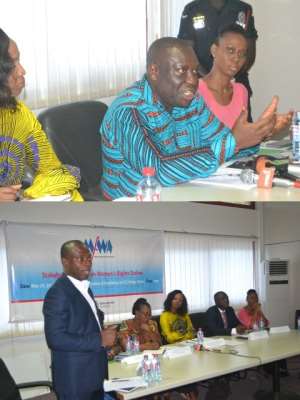
Accra, May 24, GNA - Stakeholders at a forum on Women's Rights online have called for urgent action to address barriers to women's access to the use of technology and the internet, in a bid to spur development.
According to the stakeholders, if trends in the use of ICTs and the internet persist, its spread could perpetuate the gender inequalities that society has been struggling for the past decade to address.
They made the call at a stakeholder forum on Women's Rights Online, organised by the Media Foundation for West Africa (MFWA) and the World Wide Web Foundation (WWWF), on the theme: 'Promoting and Protecting Women's Rights Online- The Role of Stakeholders.'
Mr Vincent Adotei Odotei, the Deputy Minister of Communications, said bridging the digital divide required all hands on deck and urged all the stakeholders to contribute towards achieving it.
He expressed the need to mainstream technology into the nation's way of doing things and pledged the ministry's commitment to mainstreaming technology, saying 'technology should drive the way we do things'.
'Government and the public sector must show leadership' he added.
He noted that the ministry was working to improve on accessibility by reviving the use of the Community Innovation Centres (CICs) and the Regional Innovation Centres (RICs) to allow for citizens, including women to use the internet.
He said the ministry was currently in talks with Erikson to inculcate the Girls in ICT programme into the CIC module.
The Girls in ICT programme targets young girls in rural areas and also develop girls-specific programmes at the CICs and RICs.
It will also incorporate training in coding for girls.
'We have to demystify issues of technology. Technology is not only for men or boys. These days the women in the tech space are even better than the boys,' he said.
Mr Adotei also said government was also working with the Data protection Agency and the telecommunications companies to address issues of unsolicited messages and mails.
Government, he said, would also come up with policies and subsequently legislation to ensure the safety of women online.
Mr Sulemana Braimah, Executive Director of MFWA, said the digital revolution was laying the foundation for inequalities between men and women that exist offline.
According to the report of the research undertaken by WWWF, more than 50 per cent of women were less likely to be online than their male counterparts or to be empowered to use digital tools for social and economic empowerment.
'It is rather unfortunate that over the years we've not been able to look at this as a critical foundation being laid to perpetuate the inequalities that exist in terms of empowerment,' he said.
He said it was good that it had now been identified as a problem.
He urged the stakeholders to begin to have conversations about it, raise the profile of the problem and engage the relevant policy makers to address it.
The survey covered five key areas: internet access and women's empowerment, affordability, digital skills and education, relevant content and services, and online safety with specific indicators for each area and countries graded in each area.
In Ghana, which had an overall score of 30 per cent, the study found that less than 20 per cent of women have access to the internet.
Also, high cost of data is a major constraint to women's use of the internet, with one Gigabyte of data costing over seven percent of average monthly income.
Implementation of Ghana's compulsory ICT education in schools has also been slow, while relevant content for women was also low.
GNA
By Belinda Ayamgha/ Priscilla Djentuh, GNA




 Paramount Chief of Gwollu dead
Paramount Chief of Gwollu dead
 TUC tells informal sector employers to pay their employees the minimum wage
TUC tells informal sector employers to pay their employees the minimum wage
 Prof. Marfo urges good civilian-security relations to promote peace
Prof. Marfo urges good civilian-security relations to promote peace
 I was nearly jailed because of NPP; I’m still ‘pained’ — Hopeson Adorye
I was nearly jailed because of NPP; I’m still ‘pained’ — Hopeson Adorye
 Rising against NPP after being a minister for 15 years is a sin; God will judge ...
Rising against NPP after being a minister for 15 years is a sin; God will judge ...
 Cecilia Dapaah: Reasons behind AG’s advice to EOCO not grounded in law – Martin ...
Cecilia Dapaah: Reasons behind AG’s advice to EOCO not grounded in law – Martin ...
 NPP should have reported Kingsley Nyarko’s conduct to police – Inusah Fuseini
NPP should have reported Kingsley Nyarko’s conduct to police – Inusah Fuseini
 Akufo-Addo cuts sod for MIIF Technical Training Centre
Akufo-Addo cuts sod for MIIF Technical Training Centre
 NPP didn’t struggle to win Ejisu by-election – Samuel Ayeh-Paye
NPP didn’t struggle to win Ejisu by-election – Samuel Ayeh-Paye
 Naa Ayemoede returns to school
Naa Ayemoede returns to school
